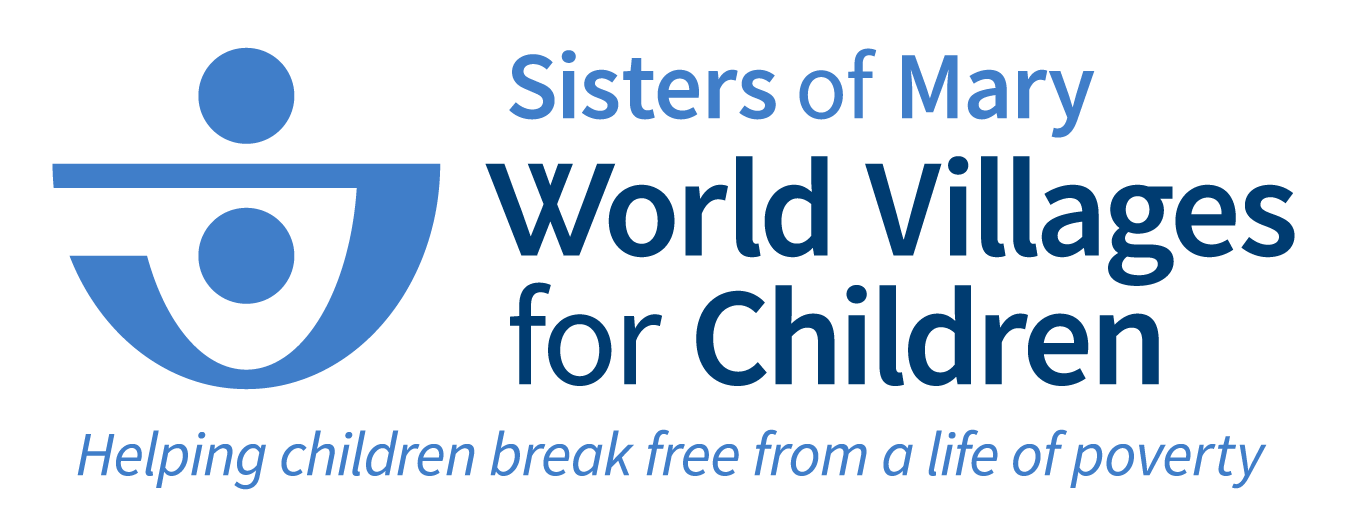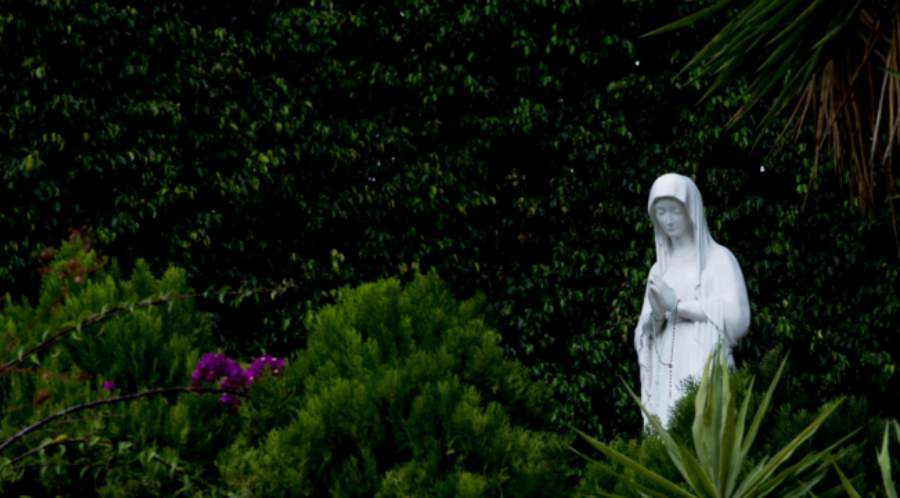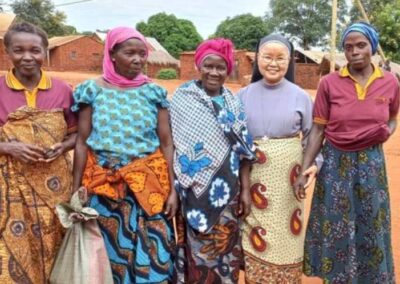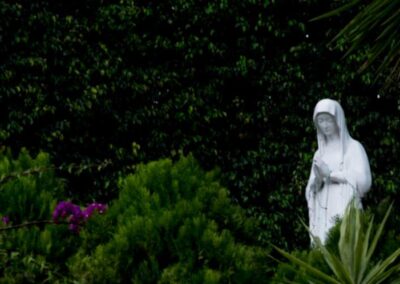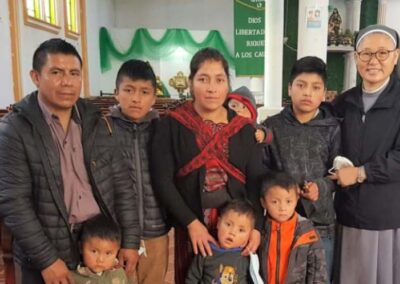In May, I took a plane to Girlstown in Mexico benignly believing I’d encounter the poor being nourished by the temporal, spiritual and maternal care of an order of Sisters. I came home two and a half weeks later with something explosive set into my conscience.
Never had I considered the terms – lived poverty or Marian poverty. But I returned home with this radical manner of living carved into my soul. Everywhere I looked, I saw Sisters willing to die for the thousands of souls set before them. I was profoundly humbled. What I saw seemed a sacred way of existing; what I saw resembled Jesus Christ as closely as anything I’ve ever encountered.
Rather than laboring over what likely will be an insufficient account of what I experienced, I’ll use this space to unpack vignettes on just two Sisters of Mary nuns (I encountered many) who’ve chosen to dwell within this sacred realm of poverty.
Sr. Hortencia Olivares Yescas, Superior of Chalco community, San Felipe, Tepatlan, Puebla.
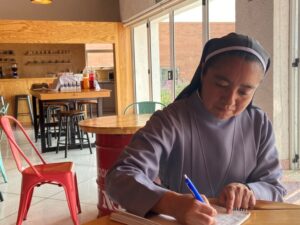
Sr. Hortencia at Girlstown in Chalco.
She’ll walk into the room and you won’t notice. She’ll serve you a glass of water and you’ll forget how it reached your hand. She’s content to be the head of the rose whose head has snapped off.
Sr. Hortencia, who has perhaps the most vital role as Superior of the Chalco Community, has found comfort in being completely forgotten.
“Because I grew up in a very poor town. I knew material poverty, but now I understand a different dimension of poverty,” she said in a soft voice. “As the eldest of nine children, I felt a pull to help my family out of their poverty. But feeding this other type of poverty [in the Sisters of the Poor] was stronger. These children pulled me to them.”
How does a meek and quiet woman direct a community of 3,300 girls in the midst of a pandemic that sent all of Chalco’s teachers home? More than half of her employees are still quarantined at home. How does she manage the depletion of staff, resources and convenience?
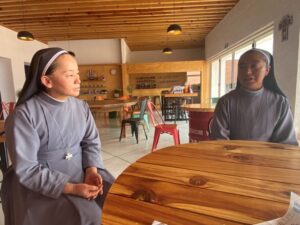
Sr. Margie and Sr. Hortencia.
“[The Virgin] Mary is the Superior and Director,” she said, echoing Fr. Al’s words. “I understand that, but on a human level it was hard for me to grasp. It was a tense feeling handing it all over to Mary. I realized, though, that I could take care of nothing by myself. Mama Mary really is in charge. It finally began to set in with me.
“There are difficulties now, but I’ve learned that all difficulties can be solved by following Fr. Al’s method. He always consulted with the Sisters and listened to different opinions. So that is what I’ve been trying to do.”
Sr. Hortencia was deeply impacted by Fr. Al’s radical witness of obliging the Virgin of the Poor. She sees a providence in his decision to leave Belgium for the poorest of the poor in Busan, South Korea and to alas touch down in her native land.
“Mexico is the “unfinished symphony” of Fr. Al. And since I’m Mexican, it is important to me to try to carry out his dream the best that I can. The dream of Fr. Al is my own dream. It is all the Sisters of Mary’s dream.”
Sr. Marinei Ferreira dos Santos, 40, from Niquelandia Brazil
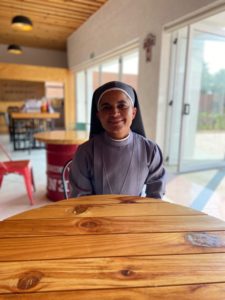
Sr. Marinei at Girlstown Chalco.
A curtain of awkward silence dropped, and the dogs barking in the countryside were the only sound as the Brazilian Sister struggled to pull a cross from her soul.
Someone asked Sister Marinei (pronounced Mar-en-ae) what she had yet to die to. Her hesitant eyes told distinctly different stories: her self-consciousness at being caught in the teeth of a perceived weakness and of her desire to fully expose it. The distant barks seemed to grow louder.
Finally – “I am sensitive,” she whispered with the awkward smile of a kindergartner at her first picture-taking. “And I know I must give that up, too. My thoughts, my hurts – it is all nothing. I must die to everything to be filled with Christ.
“To live poverty means that I must accept a certain death … now, it is not easy for me [Sr. Marinei laughs as the tension in the room loosens], but I know I need to die several times a day. I need to leave behind everything that I am.”
Sr. Marinei is an aberration, like the odd black sheep within a universe of ivory-white flocks. She is not one of them. The cheery-eyed Sister didn’t come up within the ranks. More than 90 percent of the Sisters of Mary congregation are former students and long-time members of the community. So in a way, St. Marinei is a humble, dimly-lit star in Chalco, Mexico.
The work of the Sisters is extraordinarily difficult; most aspirants from the outside simply fade away at some point in formation. But Sr. Marinei stuck. Her desire to suffer for the poor became more powerful than her desire to quit.
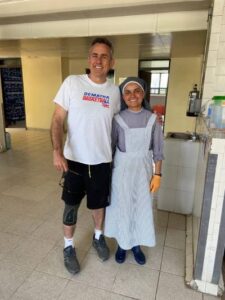
Kevin and Sr. Marinei.
From the very beginning of her life in her small central Brazilian village of Niquelandia, she pushed onward when others warned her to slow down. “I explored other communities [of Sisters]; the Oblates, the Franciscans and some others, but when I learned that the Sisters of Mary served poor children, I wanted to go that way,” she said. “When two Sisters visited me at my church one day to invite me, I was told by my [pastor] to relax. That all of this needed to be discussed, that it wasn’t good to go so fast.”
Her parents, friends and family members shared the priest’s concerns. Finally, Sr. Marinei reached out to her local ordinary, Bishop Agostinho Marochi. He smiled – Marinei – you go to the poor children.
“”So I went … but even if he said ‘No’ like the rest, I think I would have gone,” she said in an explosion of laughter. “The Sisters of Mary are different from every other congregation. I knew when I left to join them that I also had to leave my family and friends behind.
“But that is the Gospel – I leave everything – mother, father, all that I have. This is what Jesus asks of me. It is difficult, but these difficulties are great gifts. Because they allow me to offer myself fully to Him.
